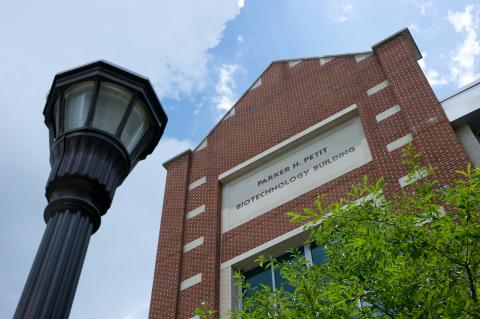event
Petit Institute Seminar
Primary tabs
"Microfabrication of Elastomeric Polymers for Organ-on-a-chip Engineering and Injectable Tissues"
Milica Radisic, Ph.D.
Professor and Canada Research Chair Institute of Biomaterials and Biomedical Engineering Department of Chemical Engineering and Applied Chemistry
University of Toronto
ABSTRACT
Recent advances in human pluripotent stem cell (hPSC) biology enable derivation of essentially any cell type in the human body, and development of three-dimensional (3D) tissue models for drug discovery, safety testing, disease modelling and regenerative medicine applications. However, limitations related to cell maturation, vascularization, cellular fidelity and inter-organ communication still remain. Relying on an engineering approach, microfluidics and microfabrication techniques our laboratory has developed new technologies aimed at overcoming them.
Since native heart tissue is unable to regenerate after injury, induced pluripotent stem cells (iPSC) represent a promising source for human cardiomyocytes. Here, biological wire (Biowire) technology will be described, developed to specifically enhance maturation levels of hPSC based cardiac tissues, by controlling tissue geometry and electrical field stimulation regime (Nunes et al Nature Methods 2013). We will describe new applications of the Biowire technology in engineering a specifically atrial and specifically ventricular cardiac tissues, safety testing of small molecule kinase inhibitors, potential new cancer drugs, and modelling of left ventricular hypertrophy using patient derived cells.
For probing of more complex physiological questions, dependent on the flow of culture media or blood, incorporation of vasculature is required, most commonly performed in organ-on-a-chip devices. Current organ-on-a-chip devices are limited by the presence of non-physiological materials such as glass and drug-absorbing PDMS as well as the necessity for specialized equipment such as vacuum lines and fluid pumps that inherently limit their throughput. An overview of two new technologies, AngioChip (Zhang et al Nature Materials 2016) and inVADE (Lai et al Advanced Functional Materials 2017) will be presented, that overcome the noted limitations and enable engineering of vascularized liver, vascularized heart tissues and studies of cancer metastasis. These platforms enable facile operation and imaging in a set-up resembling a 96-well plate. Using polymer engineering, we were able to marry two seemingly opposing criteria in these platforms, permeability and mechanical stability, to engineer vasculature suitable for biological discovery and direct surgical anastomosis to the host vasculature.
Finally, to enable minimally invasive delivery of engineered tissues into the body, a new shape-memory scaffold was developed that enables delivery of fully functional tissues on the heart, liver and aorta through a keyhole surgery (Montgomery et al Nature Materials 2017).
BIOGRAPHY
Milica Radisic, Ph.D., is a Professor at the University of Toronto, Canada Research Chair (Tier 2) in Functional Cardiovascular Tissue Engineering and a Senior Scientist at the Toronto General Research Institute. She is also the Associate Chair-Research for the Department of Chemical Engineering and Applied Chemistry at the University of Toronto and Director of the NSERC CREATE Training Program in Organ-on-a-Chip Engineering and Entrepreneurship. She obtained B.Eng. from McMaster University, and Ph.D. form the Massachusetts Institute of Technology. She is a Fellow of the Royal Society of Canada-Academy of Science, Canadian Academy of Engineering and the American Institute for Medical and Biological Engineering. She received numerous awards and fellowships, including MIT Technology Review Top 35 Innovators under 35. She was a recipient of the Professional Engineers Ontario-Young Engineer Medal in 2011, Engineers Canada Young Engineer Achievement Award in 2012, Queen Elizabeth II Diamond Jubilee Medal in 2013 and NSERC E.W.R Steacie Fellowship in 2014. The long term objective of Radisic’s research is to enable cardiovascular regeneration through tissue engineering and development of new biomaterials. Her research interests also include microfluidic cell separation and development of in vitro models for drug testing. Currently, she holds research funding from CIHR, NSERC, CFI, ORF, NIH, and the Heart and Stroke Foundation. She is an Associate Editor for ACS Biomaterials Science & Engineering, a member of the Editorial Board of Tissue Engineering, Advanced Drug Delivery Reviews and Regenerative Biomaterials. She serves on review panels for Canadian Institutes of Health Research and the National Institutes of Health. She is actively involved with BMES (Cardiovascular Track Chair in 2013 and 2104) and TERMIS-AM (Council member, Chair of the Membership Committee). She was a co-organizer of a 2017 Keystone Symposium, “Engineered Cells and Tissues as Platforms for Discovery and Therapy”. Her research findings were presented in over 160 research papers, reviews and book chapters with h-index of 54 and over 10,000 citations. She is a co-founder of a New York-based company TARA Biosystems, that uses human engineered heart tissues in drug development and safety testing for major pharmaceutical companies. She serves on the Board of Directors for Ontario Society of Professional Engineers and TARA Biosystems.
Groups
Status
- Workflow status: Published
- Created by: Colly Mitchell
- Created: 10/10/2018
- Modified By: Colly Mitchell
- Modified: 10/29/2018
Categories
Keywords
User Data
Target Audience


